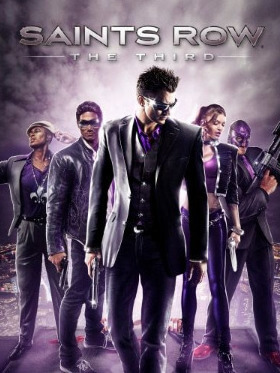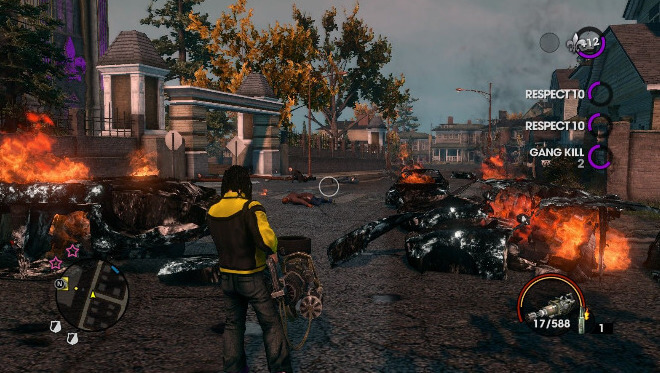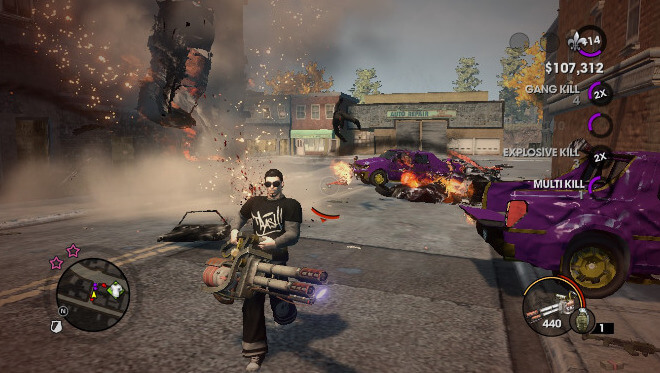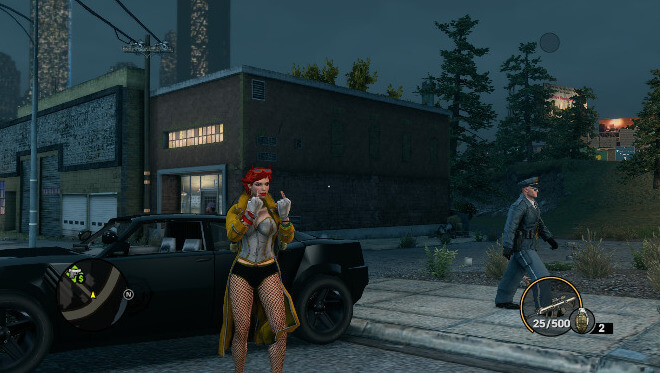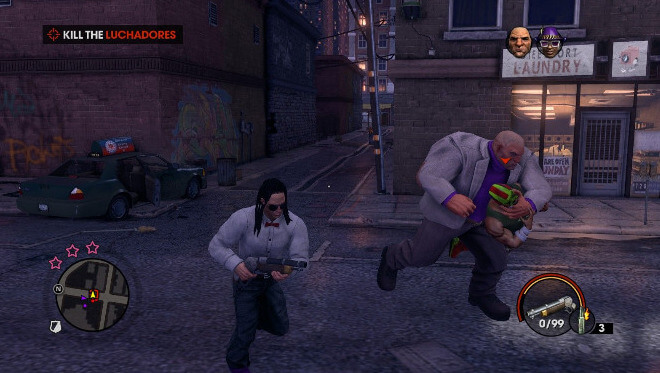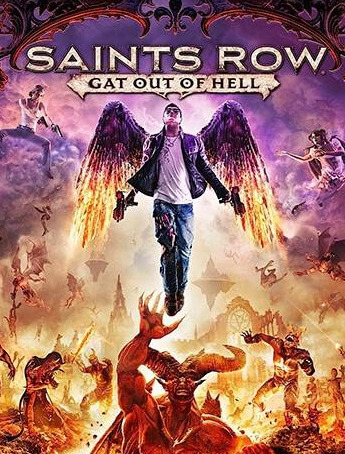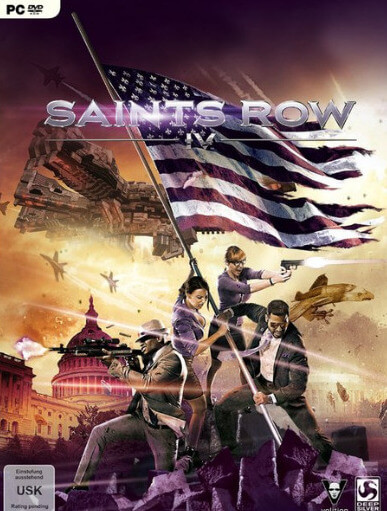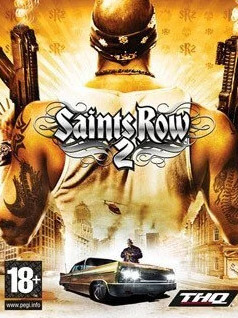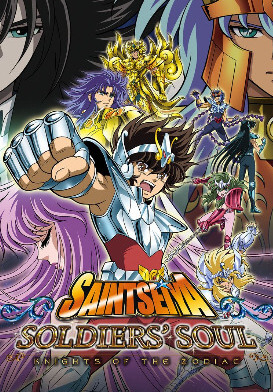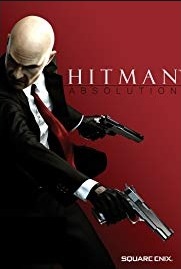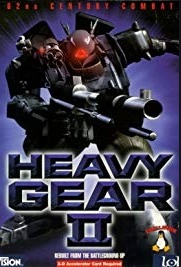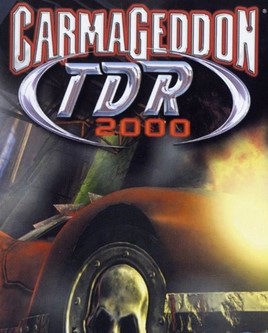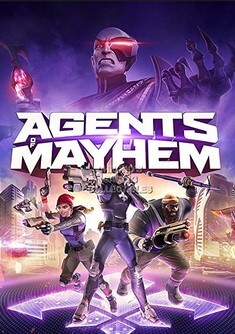The series has historically been considered a clone of Grand Theft Auto that later positioned itself as more "gleefully silly" in comparison. In combat, players select weapons from a weapon selection wheel, including regular pistols, submachine guns, shotguns, and rocket launchers alongside special weapons such as UAV drones and a fart-in-a-jar stun grenade. Player melee attacks include running attacks such as DDTs and a purple dildo bat. Players may use vehicles to navigate the city, including a hover jet (known as the F-69 VTOL) and a pixelated retrogame tank that are unlocked through story missions. Once special vehicles are unlocked, they are in unlimited supply and can be delivered directly to the player-character's location. Player actions are intensified with what Volition calls the "awesome button", where for example the player will divekick through the windshield into the driver's seat of a car. The main story campaign missions can be played alone, or cooperatively either online or via System Link offline. Some elements are added to the campaign for the second player. There is no competitive multiplayer, but a "wave-based survival mode" called Whored Mode that supports up to two players.
Players customize their characters after the introductory mission. Player-character bodies, dress, and vehicles can be customized, as well as home properties. Players can additionally share their character designs in a Saints Row online community. Apart from the main story missions, there are optional diversions to make money and earn reputation, such as Insurance Fraud, where players hurt themselves in traffic to maximize self-injury before a timer expires, or Mayhem, where players maximize property destruction before a time expires. Some of these diversions were introduced in previous Saints Row games. Activities serve the plot and are positioned as training the player-character or damaging the Syndicate. They can also be repeated. Outside of structured diversions, players are free to make their own fun by purchasing property, shopping for items, finding hidden sex doll and money cache collectibles, and wreaking unsolicited havoc. There are also "flashpoint" gang operations that grant respect when disrupted. Attacking others increases the player's notoriety level, as depicted with stars.
Saints Row: The Third introduced experience levels and weapon upgrades to the series. Most actions in the game come with incentives in the form of money and respect (reputation). Money buys land, weapons, and other upgrades,h and respect is a kind of experience point that can unlock player abilities like "no damage from falling" or "infinite sprint",i as well as upgrades to the player's computer-controlled gang member support. In turn, players receive further incentive to nearly miss car collisions, streak naked through the streets, shoot others in the groin, blow up Smart cars, and kill mascots in ambient challenges to earn more respect. Lack of respect does not hinder story progress, as it has in previous games. Player progress and unlocks are managed by an in-game cell phone menu that also lets the player call for vehicle deliveries and non-player character backup. The computer-controlled support will also dialogue with each other.
Plot
Five years after the events of Saints Row 2, the 3rd Street Saints have merged with the Ultor Corporation to become a media and consumer empire, with assets that include an energy drink, a lifestyle brand, and a chain of clothing stores. While robbing a bank to promote the upcoming Saints Row: The Movie, the Boss and top lieutenants Shaundi and Johnny Gat experience unanticipated resistance from the staff and are arrested by corrupt policemen. They are turned over to Phillipe Loren, the mastermind behind an international criminal enterprise known as the "Syndicate" who wishes to make a deal with the Saints, seeing them as a threat. The Saints refuse and stage a breakout, with Gat seemingly sacrificing himself to allow Shaundi and the Boss to escape.
They land in Steelport, a city ruled by the Syndicate that is dominated by three gangs: the Morningstar, the gang who control Steelport's sex trade led by Loren and the DeWynter sisters; the Luchadores, a Mexican masked wrestler-themed gang led by undefeated wrestling champion Eddie "Killbane" Pryor; and the Deckers, a unit of talented cyber-goth hackers led by British programmer Matt Miller. With no supplies, the Boss contacts fellow Saints lieutenant Pierce Washington and has him provide manpower for a raid on the city's arsenal. Using their new firepower, the Saints enter Morningstar territory and begin attacking their interests. They then hunt down Loren in his own building, in the process freeing Oleg Kirrlov, a former KGB agent turned test subject for the Syndicate's cloning initiative. After the Boss kills Loren by crushing him with a heavy chandelier, they either destroy the building or claim it for the Saints, declaring victory over the Syndicate regardless.
During the opening of a new city bridge by Senator Monica Hughes, the Luchadores stage an ambush and kill several dozen Saints. To retaliate, the Boss seeks out individuals with grudges against the Syndicate. The search nets: Kinzie Kensington, an ex-FBI agent targeted by the Deckers for investigating them; Zimos, an old pimp who lost his business to the Morningstar; and Angel de la Muerte, Killbane's embittered former wrestling partner. The Boss helps Zimos reestablish his prostitution ring, wrecking the Morningstar's influence. Killbane tries to wrest control from the DeWynter sisters, killing the elder sister Kiki in a jealous rage and causing her sister Viola to defect to the Saints. Meanwhile, with the federal government under pressure to confront the growing lawlessness in Steelport, the Special Tactical Anti-Gang (S.T.A.G.) task force is formed under the leadership of Hughes and Cyrus Temple. Armed with highly advanced technology, STAG puts the city under martial law until order can be restored.
